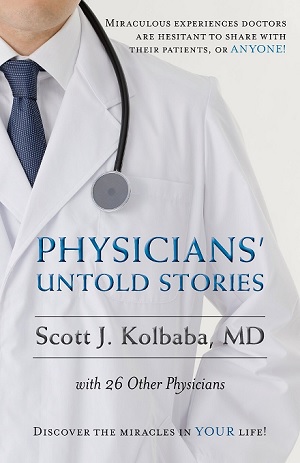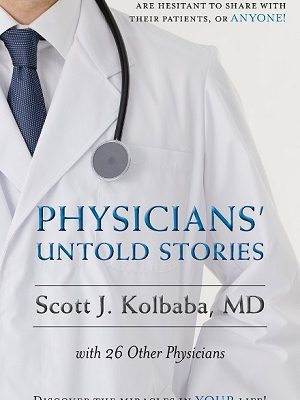Miraculous Experiences Doctors Are Hesitant to Share with Their Patients, or ANYONE

Read: Ask, Believe, Receive
Physicians’ Untold Stories: Miraculous Experiences Doctors Are Hesitant to Share with Their Patients, or ANYONE by Scott J. Kolbaba, MD, is a collection of extraordinary and miraculous accounts shared by physicians. These stories range from near-death experiences, encounters with the supernatural, divine interventions, and inexplicable recoveries. The book showcases how medicine intersects with the spiritual, revealing moments that defy scientific explanation. Below are the lessons from the book:
1. The Power of Faith and Healing
A central theme of the book is the role of faith in healing. Several stories highlight how a strong belief in a higher power can lead to miraculous recoveries. For example, many patients who were given no hope by medical standards survived due to an inexplicable intervention, often attributed to prayer or faith. These accounts suggest that medicine and spirituality are interconnected, and faith can sometimes play an influential role in healing.
2. Trusting Intuition and Gut Feelings
Many physicians in the book describe moments when they followed their instincts, even when clinical evidence suggested otherwise. These gut feelings often led to life-saving decisions. For instance, a doctor might suddenly feel compelled to run a certain test or perform a procedure based on a hunch, only to discover that it saved the patient’s life. The lesson here is that intuition should not be underestimated in medicine; it often guides professionals in ways that data or traditional protocols might not.
3. Divine Interventions
Kolbaba shares multiple instances where doctors witnessed what they can only describe as divine interventions. These moments might include a mysterious force guiding a surgeon’s hand, patients experiencing visions of loved ones during critical moments, or even miraculous recoveries with no scientific explanation. Such experiences highlight the possibility of a higher power at work in healthcare settings.
4. Unexplained Phenomena in Medical Practice
Throughout the book, there are stories of inexplicable phenomena that doctors cannot fully understand or explain. These include experiences such as:
- Near-death experiences: Patients recount vivid experiences of seeing a “light” or having out-of-body experiences during medical emergencies.
- Supernatural occurrences: Some doctors share stories of patients who reported encounters with deceased relatives or guardian angels.
- Spontaneous healing: Cases where terminally ill patients recovered without any clear medical reason, leaving doctors amazed.
These stories challenge the purely scientific view of medicine, urging readers to consider that there may be more at play than what meets the eye.
5. The Importance of Compassion in Medicine
Compassion and human connection are recurring themes in the book. Doctors often recount how a kind gesture, a heartfelt conversation, or emotional support significantly impacted patients’ well-being. This lesson emphasizes that medical treatment is not just about curing physical ailments, but also about providing emotional care. The emotional and spiritual aspects of healing can be just as important as the physical ones.
6. The Power of Hope
Many stories revolve around patients who were given little to no chance of survival but made miraculous recoveries. Doctors observed how hope, positivity, and the will to live played a crucial role in these cases. Kolbaba suggests that maintaining hope, even in dire circumstances, can influence outcomes in unexpected ways. This highlights the importance of fostering optimism in both patients and caregivers.
7. Collaboration Between Science and the Supernatural
One of the book’s most compelling messages is that science and spirituality can coexist in the medical field. While modern medicine relies heavily on science, there are moments when the supernatural and unexplained phenomena play a role in patient care. Physicians in the book learned to accept that not everything can be explained by science alone, and there is room for mystery and the unknown in the healing process.
8. Humility in the Face of the Unknown
The physicians featured in Physicians’ Untold Stories often express humility when confronted with experiences beyond their understanding. These doctors, trained to rely on science and evidence, sometimes encountered situations that defied medical logic. Their openness to these experiences shows the importance of remaining humble and accepting that some aspects of healing may remain a mystery.
Conclusion
Physicians’ Untold Stories by Scott J. Kolbaba, MD, invites readers to explore the spiritual side of medicine. The miraculous stories shared in this book teach us that there is more to healing than just science. Faith, intuition, divine intervention, compassion, hope, and an acceptance of the unknown all play vital roles in the journey of healing. For those looking to understand the profound and sometimes mystical experiences of doctors and patients, this book offers a thought-provoking and inspiring exploration of the extraordinary moments that happen behind the scenes in healthcare (Amazon).



